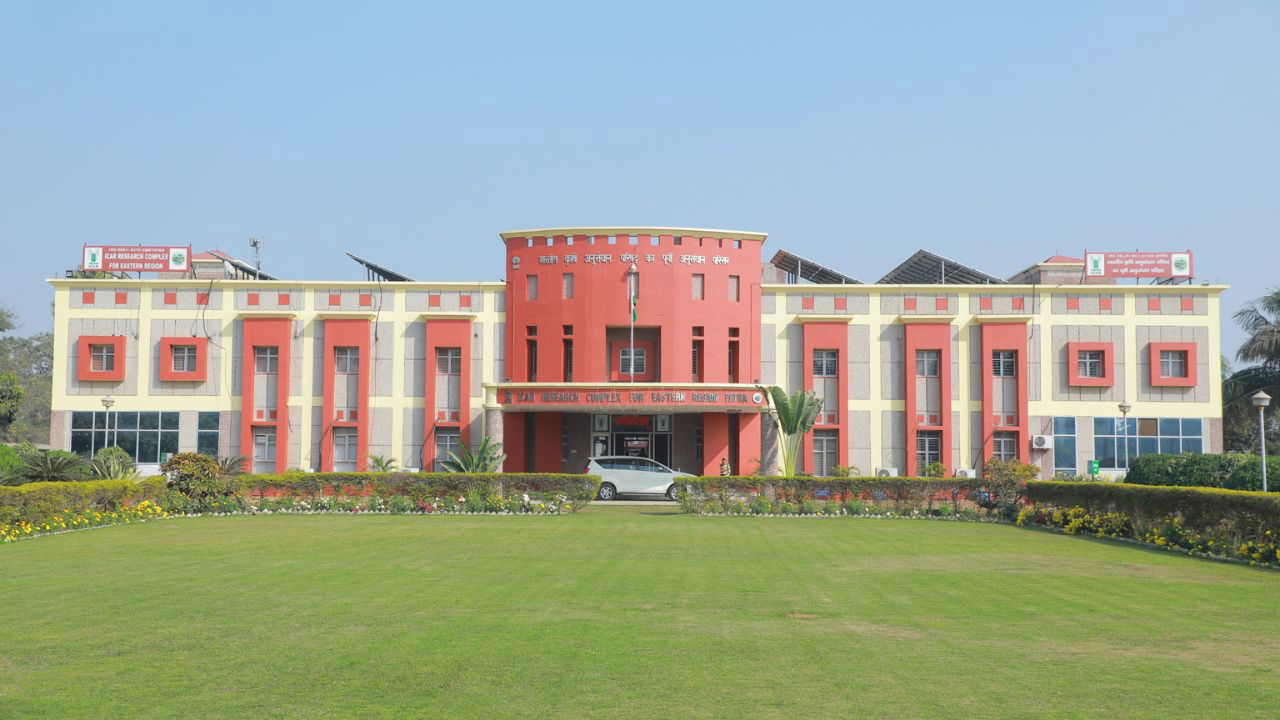
ICAR Research Complex for Eastern Region, Patna, has been a beacon of agricultural research and innovation in the eastern region since last 24 years. Serving farmers and stakeholders across seven states—Bihar, Eastern Uttar Pradesh, West Bengal, Jharkhand, Odisha, Chhattisgarh, and Assam—the institute has contributed significantly in advancement of agricultural productivity and sustainability. As ICAR-RCER celebrates its Silver Jubilee Foundation Day on February 22, 2025, we reflect on its transformative impact on the region and the agricultural landscape of India.
The Foundation stone of the institute was laid by the then Union Agriculture Minister, Govt of India Nitish Kumar in the presence of Dr. RS Paroda, the Secretary of Department of Agricultural Research and Education and Director General of ICAR. The institute emerged from the merger of three key agricultural research stations: Directorate of Water Management Research, Patna; Central Horticultural Experiment Station, Ranchi; and the Central Tobacco Research Station, Pusa. This consolidation allowed the institute to address a wide spectrum of agricultural challenges.
Before shifting of headquarters in its present new office and lab building in 2007 it was operated from WALMI, Patna since its inception. Later on KVK, Buxar in 2007 and KVK, Ramgarh in 2014 were given to the institute. Today, ICAR RCER is a key agricultural research institute functioning under Natural Resource Management division of ICAR, New Delhi. It operates through four specialized divisions: Land and Water Management, Crop Research, Livestock and Fisheries Management, and Socio-Economics & Extension, along with a regional station in Ranchi and two KVKs at Buxar and Ramgarh, actively engaged in technology dissemination to farmers.
ICAR’s 25-year journey has been marked by numerous accomplishments that have radically transformed Eastern India’s agricultural landscape. Let’s take a look at some of its key achievements:
-
The development of IFS models for different agro- ecological zones, including irrigated, rainfed, and hill regions. It has helped farmers reduce fertilizers consumption by 20-30%,enhanced soil organic carbon by 6-11% and increased their income by Rs 1.7-2.0 lakh per ha.
-
Technology for greening rice fallow area has been developed which includes use of short duration varieties of paddy in kharif followed by chickpea, lentil, safflower and mustard coupled with use of soil moisture conserving techniques.
-
Technological interventions for sustainable intensification of rice –wheat system comprising no-till wheat, summer moong bean along with residue retention have been developed and demonstrated in about 10,000 hectares under climate resilient agriculture programme, boosting system productivity by 30% and reducing greenhouse gas emissions by ~10%.
-
Resource conservation technology for vegetable production involving raised beds, drip fertigation, and poly-mulching have significantly increased water productivity and income, reaching up to Rs. 2-3 lakh per acre in hill and plateau region.
-
Released 12 high-yielding, climate-resilient rice varieties like Swarna Shreya and Swarna Samriddhi, covering lakhs of hectares in Eastern Region beyond.
-
Developed 63 high-yielding, nutrient-rich Varieties of Vegetables, one drought-tolerant chickpea, first-ever Makhana variety Swarna Vaidehi and 6 Fruit varieties for diverse climatic conditions.
-
The institute has developed a multipurpose tree-based agroforestry model for rehabilitating coal mine- affected areas in Jharkhand, transforming barren lands into productive, remunerative farming landscapes. In fruit crop management, the Centre has developed technologies such as ultra-high-density orchard for guava, fruit-based multi-tier systems, and rejuvenation of old and senile mango orchards.
-
It has developed the Solar energy based implements like solar paddy thresher, solar insect trap. A software solution Solar Irrigation Pump Sizing Tool has also developed, for selecting the right size of solar pump, and adopted in the PM-KUSUM scheme of Ministry of New and Renewable Energy.
-
Indigenous breeds like Purnea cattle and Maithili ducks were registered and 6 more livestock breeds, identified for registration by the Institute. Also “Swarna Min,” a mineral mixture is developed for Bihar and Jharkhand, which increases milk productivity by 13%.
Through the Climate resilient agriculture program (CRAP) of Govt of Bihar, large scale awareness was created among thousands of farmers in Gaya and Buxar regarding use of climate-resilient crop varieties, resource conservation technologies, crop diversification, intercropping, custom hiring centre etc.
In a significant milestone, the Ranchi Centre of ICAR-RCER has secured Rs.17.68 crore in funding from the Government of Jharkhand under the RKVY initiative for seven transformative projects. These projects are set to revolutionize farming in the Eastern Hill and Plateau region by introducing precision technologies, conserving indigenous crops, and empowering farmers through innovations like inter-specific grafting, organic fruit systems, and jackfruit value addition. Focused on farmer producer organizations and underutilized crops, these initiatives aim to enhance livelihoods, improve nutritional security, and foster entrepreneurship among tribal communities—a giant leap toward sustainable farming and regional prosperity.
Looking ahead, this institute aims to promote sustainable agricultural practices with smart technologies, precision tools, and digital platforms. The goal is to address future climate challenges, attract youths to agriculture, and foster entrepreneurship. ICAR Research Complex for Eastern Region’s 25-year journey reflects its unwavering dedication to agriculture and empowering farmers. As the institute continues to innovate and collaborate, it remains a cornerstone of agricultural advancement in Eastern India, ensuring a sustainable and prosperous future for moving towards Viksit Bharat.
















